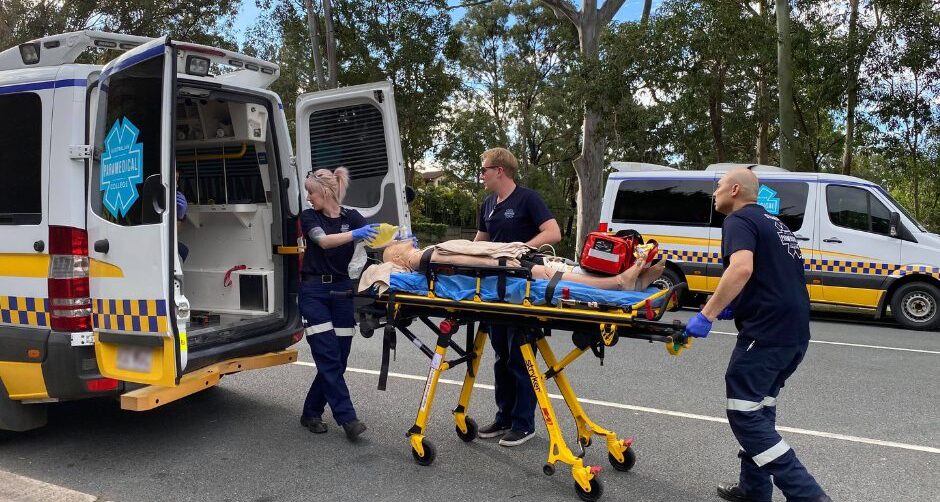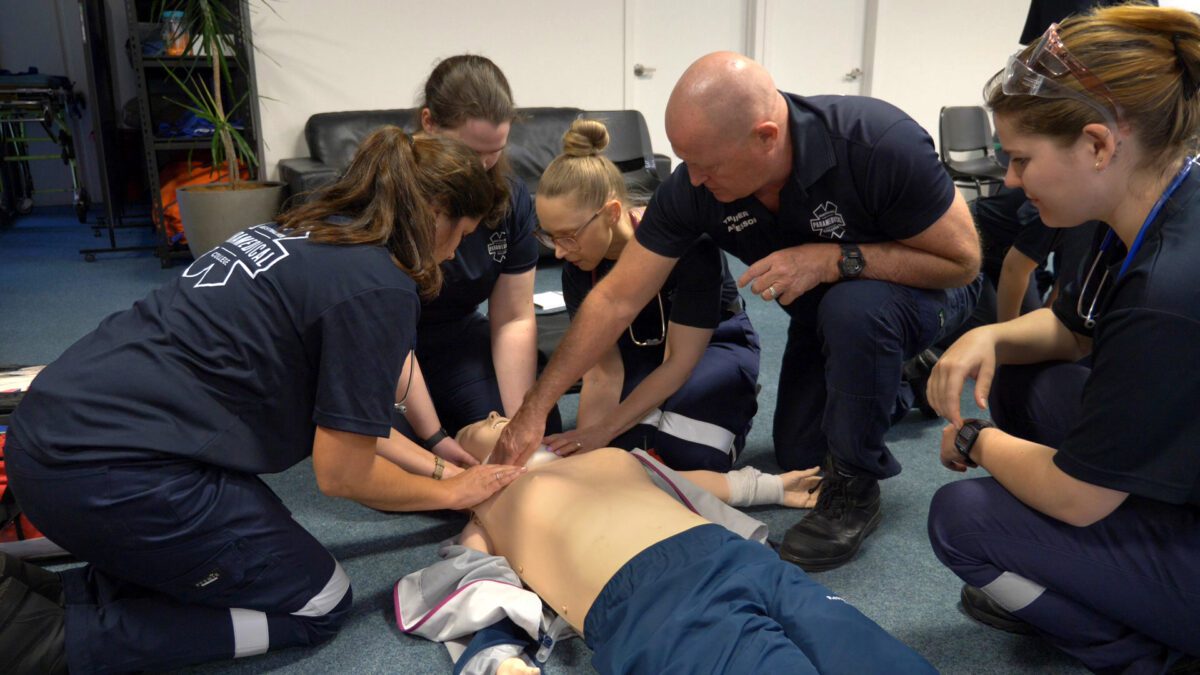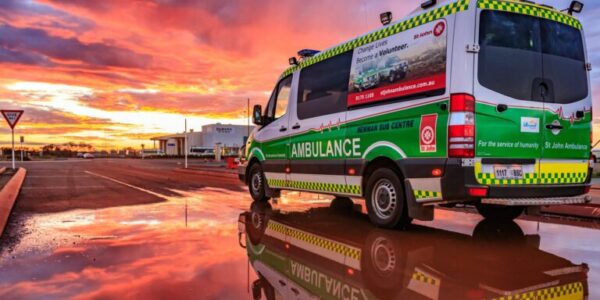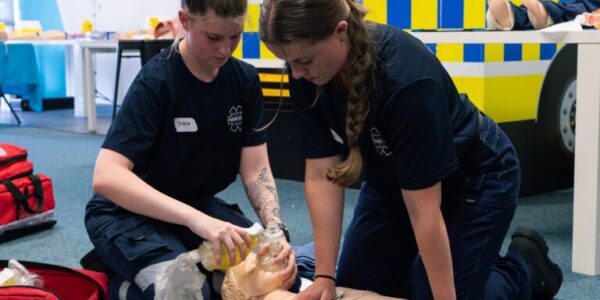Re-published 28th April, 2025
Interested in working in emergency healthcare? It’s possible to become a Basic or Advanced Life Support Medic, Ambulance Officer, or Ambulance Attendant in as little as 12 months. For motivated individuals, that’s all the time it takes to complete an entry-level qualification and begin working in the pre-hospital care sector.
If your goal is to become a Paramedic, the training pathway is different. Paramedics in Australia are required to complete a university-level qualification—usually a Bachelor of Paramedicine.
In this article, we’ll explain the different training options available for both medics and paramedics, so you can choose the path that aligns with your goals, timeline, and career aspirations.
A guide for beginners
If you’re new to healthcare but feel drawn to the industry, you’re not alone. A 2024 study by Career Sidekick found that around 30% of people have changed careers at some point in their working life.
Making a career change can feel overwhelming at first, but it often brings long-term benefits—like greater job satisfaction, personal growth, and new opportunities. It can also help you move away from industries that may be declining in demand.
According to the Australian Government’s Labour Market Insights (2024), Health Care and Social Assistance is the country’s largest employment sector. It grew by 25.8% in recent years and is expected to grow by another 15.8%. That means it’s a stable field with strong prospects for career development—an ideal space for anyone looking to start fresh or build a long-term future.
*Career SideKick (2024)
*Labour Marketing Insights (2024)
The difference between a Medic and a Paramedic
While Medics and Paramedics often work in similar environments, their training, qualifications, and scope of practice are different.
A Medic, also referred to as an Emergency Medical Technician (EMT), Ambulance Officer, or Ambulance Attendant, is trained to provide basic to advanced life support. Medic qualifications can usually be completed in 12 to 24 months through vocational training. This makes it a quicker pathway into the workforce compared to becoming a Paramedic, which typically requires 3 to 4 years of university study.
Medics are equipped to respond to medical emergencies, provide patient care, and support the work of Paramedics, but they have a more limited scope of practice. For many, working as a Medic is a way to gain valuable industry experience, confirm a passion for emergency healthcare, and decide whether pursuing a Bachelor of Paramedicine is the right long-term goal.

Become a Basic-to-Advanced Life Support Medic, Ambulance Officer or Ambulance Attendant
If you’re aiming to become a Medic, Ambulance Officer, or Ambulance Attendant, you’ll often find opportunities in the private sector. Medics frequently provide healthcare support at sporting events, music festivals, concerts, and corporate events, rather than working with public ambulance services.
Below are the key qualification pathways depending on your career goals:
Basic Life Support: Certificate IV in Health Care (HLT41120)
The HLT41120 – Certificate IV in Health Care is a nationally recognised, entry-level qualification that equips you with the core skills to work as a Basic Life Support Medic. This course covers patient assessment, clinical skills, and emergency response procedures, preparing you to deliver effective pre-hospital care.
-
Study duration: approximately 12–18 months.
-
Delivered online with in-person clinical workshops.
-
Nationally recognised qualification through Australian Paramedical College.
This course is ideal for those seeking to work in non-emergency or basic emergency settings across Australia.
Advanced Life Support: Diploma of Emergency Health Care (HLT51020)
If you want to build on your skills and handle more advanced pre-hospital situations, the HLT51020 – Diploma of Emergency Health Care offers a comprehensive pathway.
-
Study duration: approximately 18–24 months.
-
Includes training in advanced airway management, pharmacology, and complex patient care.
-
Can offer a pathway into university, offering the chance for credits and discounted course fees.
Graduates are eligible for a wide range of roles, including Advanced Medic, Emergency Medical Technician (EMT), Ambulance Attendant, and First Responder positions.
Non-Emergency Patient Transport: Certificate III (HLT31120)
If you prefer a calmer environment focused on patient support rather than emergency response, consider studying the HLT31120 – Certificate III in Non-Emergency Patient Transport.
-
Study duration: approximately 12 months.
-
Prepares you for roles assisting with safe transport of patients between healthcare facilities.
-
Covers basic health monitoring, communication skills, and patient care procedures.
This qualification is perfect for those wanting to begin a healthcare career without entering emergency services straight away.
Becoming a Paramedic in Australia
Qualifications do you need to be a Paramedic in Australia
To work under the title of ‘Paramedic’ in Australia, you must complete a recognised university-level qualification, usually a Bachelor of Paramedicine or Bachelor of Paramedic Science. This requirement has been in place since 2018 under national registration laws.
University entry can be competitive, with high ATAR requirements often making direct access challenging. For those looking for an alternative entry pathway, Vocational Education and Training (VET) courses provide a practical solution.
At Australian Paramedical College (APC), our HLT51020 – Diploma of Emergency Health Care is designed in line with industry standards. It helps students build clinical skills in patient assessment, emergency response, and healthcare communication. Diploma graduates can then pursue employment opportunities in the private sector or use their qualification as a stepping stone towards university study in Paramedicine.
Beyond clinical skills, modern paramedics need strong communication, emotional intelligence, and critical thinking abilities. Paramedics regularly work alongside hospital staff, emergency workers, and members of the public, often in high-pressure situations. The ability to show empathy, adapt to different cultural values, and remain calm under pressure is just as important as medical knowledge.
Choosing a VET pathway can provide both the technical and interpersonal foundations needed to succeed in a paramedicine career.
To learn more about this pathway with APC, click here.

Why study paramedicine at Australian Paramedical College (APC)
At APC, we know there is no substitute for real-world experience when starting your career as a Medic or Paramedic. That’s why our courses are designed to fit around your lifestyle.
Over 90% of our course content is delivered online, allowing you to study flexibly while working full-time or part-time. With just a few hours of study each week, you could gain a nationally recognised qualification and start a new career in under 12 months.
With APC’s strong industry connections, hands-on clinical workshops, and expert trainer support, you’ll graduate with the skills, confidence, and experience needed to take the next step towards your dream role in emergency healthcare.
Employment opportunities as a Medic or Paramedic
When you graduate, understanding where to find job opportunities is just as important as earning your qualification.
The first step is deciding whether you want to work in the private sector or for a state ambulance service. Private sector roles are available with organisations such as mining companies, construction firms, event medical services, and healthcare providers. Many APC graduates have successfully gained employment through our trusted Industry Partners.
Volunteering is another valuable way to build your network and gain practical experience. Many students volunteer with local events or community organisations while completing their studies, opening doors to future job offers.
If you’re studying the HLT51020 – Diploma of Emergency Health Care or HLT41120 – Certificate IV in Health Care, opportunities in the mining, construction, and oil and gas industries are especially strong. FIFO (Fly-In-Fly-Out) Medic roles in remote locations can offer salaries above $100,000, along with valuable on-the-ground experience that strengthens your career prospects.
Paramedic Career Development Plan
Not sure where to start? We’re here to help.
Take a few minutes to tell us about your goals, background, and the type of work you’re interested in. Our team will create a personalised career development plan to guide you through your options, helping you find the best pathway into emergency healthcare.
You’ll receive a clear, step-by-step plan that shows how to build a long and rewarding career helping people and saving lives.


